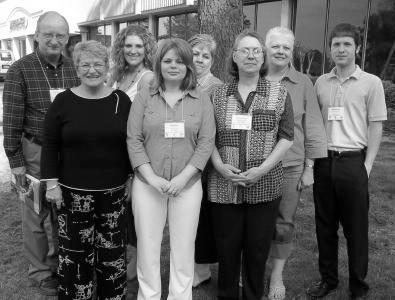ED WATCH: Big Otter School Attracts Calhoun Students, Taking Back Our Schools


Marge Bragg, a Challenge WV fellow from Clay County,
says the Clay County school system is over-building the new
Valley Dale consolidated school at Big Otter to attract
students from Calhoun's Washington District."
By Dianne Weaver
"Taking Back Our Schools, Taking Back Our Communities," was the theme of the Rural School and Community Trust working group meeting in April at Olive Branch, Mississippi.
Eight Challenge WV fellows participated in the three-day meeting, attended by representatives from several states, most of which live in rural areas of the USA, all advocating for community-based schools.
Over 40% of the USAs public schools are in rural areas.
Challenge WV coordinator Linda Martin said it is an issue of fairness, but "It speaks about the value of place, communities that matter and giving children a good education."
"It's about what is right. What works best," she said, "This conference brings together many different voices."
There was a discussion about "breaking the fall" of rural schools with declining enrollment, which is resulting in financial distress using capitated funding mechanisms.

Challenge WV Fellows from around WV travel to Mississippi for conference (front L-R) Linda Martin, Robin Kelly, Dianne Weaver (rear L-R) Paul Hamrick, Danielle Johnston, Lorelei Scarbro, Thomas Ramey
This financial hemorrhage results in deep cuts of programs, staffs and resources.
Declining enrollment of community-based schools in WV has resulted in wholesale school consolidation, with its promise of a better education, more courses, more opportunity ... after the long bus ride.
"There has been little evidence of that 'promise' in WV," said Challenge member Thomas Ramey.
"Lincoln County WV has been a consolidation battle ground, the State Board took over the county system over five years ago, and test scores continue to decline," he said.
Ramey said students in the southern part of the county are being encouraged by the state department to go to a school in the next county, which is likely to bankrupt the Lincoln school system.
"They're taking Lincoln taxpayer money, and capitated school funding money to Logan County," Ramey said, "It is the next generation of consolidation to a regional level, away from the community and county."
It will likely be sold to taxpayers as "a matter of choice," he said.
County school boards have already had most of their constitutional power taken away from them by the WV legislature.
"This is a long-planned move toward the RESA (regionalized) system to be in control of local school systems," Ramey said.
Martin said "States and communities must act through grass-root efforts to see that students are offered a good education in their own communities."
"More often than not, these students are left behind," she said, "Education cannot be compromised by geography."
One of the conference workshops was "Consolidation: Carrots, Sticks and Smokescreens," a discussion on "quiet policies" that put small, rural schools at risk, especially in the poorest communities.
Jerry Johnson of the Rural Trust staff, led a workshop on inequity and achievement in rural schools, illustrating how achievement gaps "mirror" resource gaps.
Johnson said that policymakers set out to close small, rural schools for a variety of reasons - some well intentioned, some bad intentioned, some practical and some ideological.
"They nearly always turn to efficiency, small schools costing too much to operate. Stakeholders need to provide the information (research) that small schools can operate efficiently, and deliver a quality education," Johnson said, sometimes using Distance Learning Centers.
Iowa state advocates said their small school districts are an "achievement blessing." The study available at www.ruraledu.org
A discussion group, "Plugging the the pipeline from the schoolhouse to the jail house," presented an overview of the Mississippi Juvenile Justice Reform Act of 2005.
Marty Strange, policy director for the Rural Schools and Community Trust, said "The geographic and political isolation on rural communities often means that rural schools are forgotten in the larger debate over education policy.
"Rural kids represent the face of America," as diverse as an urban population, Strange said. "They work well and they're cost effective."
Jana Freeman, longtime WV Challenge member, expressed concern that the federal 'No Child Left Behind' Act has several provisions that indeed leave rural teachers and children behind, making it difficult to report test data and recruiting and retaining teachers.
Learn more about Challenge WV